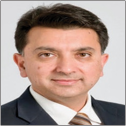Translate this page into:
Future of health care: The power and paradox of data

-
Received: ,
Accepted: ,
How to cite this article: Kohli M. Future of health care: The power and paradox of data. IHOPE J Ophthalmol 2022;1:14-5.
Keynote on Big Data
The world spends around 10% of the gross domestic product on an average on health care, nearly 30% is being wasted. This is summed up by lack of availability of health care to 3 billion people the brunt being faced by the low- and middle-income countries. The reasons for this wastage include failure of care delivery or coordination, pricing failure, poor treatment, and administrative issues.
Health care has the highest growth of annual data, around 48% per year. Wise usage of data, however, is dismal and lacks large insights. Dynamic acquisition, aggregation, processing, and democratization of data are needed to raise powerful insights for day-to-day clinical insights and judgments in health care. Self-health is determined by personal behavior, genomics, and socioenvironmental factors. Personalized data on all these domains are now available or will be available in future to various organizations due to internet. COVID pandemic has brought data and telemedicine to the forefront, and world has started to accept them, including the policy-makers.
While apps, robots, and artificial intelligence are being seen to be crucial in the future, we still lack data from all geographic locations to support their working. Digital health ecosystem relies on good governance and workforce, interoperability of data, conversion and linkage to outcomes, and then finally empowering the health-care professional. The future is set to see a broader overlap between operations and technology, which will be formative for India. Data and intelligence together will improve assessment of risks which are pivotal for health care. The more we empower the ground force to data-driven health care with scope for innovation, the better the results. Virtualization, which includes telehealth, will improve functioning at both ends that of the employees as well as the patients. Sharing secured and standardized data are of essence, as ownership of data is currently contentious.
Efficient digital health system requires interoperability and perspective analytics to improve population health. Health information and management system are key to its success. These systems include aspects that look at analytics maturity, continuity of care, supply chain, digital imaging, electronic records, infrastructure, and outpatient adoption models. Analytic maturity model will enable personalized medicine and perspective analytics. “Wings of Hope,” an aviation-based non-governmental organization, utilizes telehealth, remote patient monitoring, drone programs, data analytics, and supply chain analytics. Data regarding workforce, access, cost, safety, and quality are central to an improved patient experience and outcome. This will allow us to make measurable differences to the health-care system.
Declaration of patient consent
Patient’s consent not required as there are no patients in this study.
Financial support and sponsorship
Nil.
Conflicts of interest
There are no conflicts of interest.





